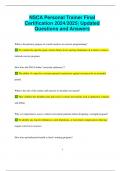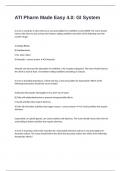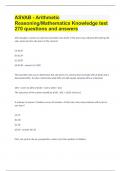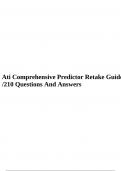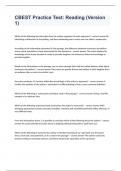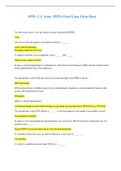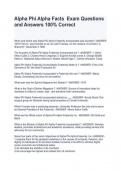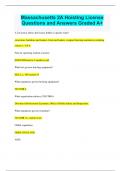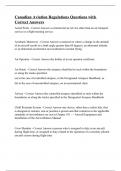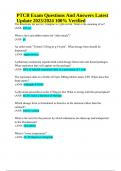Certification 2024/2025| Updated
Questions and Answers
What is the primary purpose of a needs analysis in exercise programming?
To evaluate the specific goals, current fitness level, and any limitations of a client to create a
tailored exercise program.
How does the NSCA define "muscular endurance"?
The ability of a muscle to sustain repeated contractions against resistance for an extended
period.
What is the role of the rotator cuff muscles in shoulder movement?
They stabilize the shoulder joint and assist in various movements such as abduction, rotation,
and lifting.
Why is it important to assess a client's movement patterns before designing a strength program?
To identify any muscle imbalances, joint limitations, or movement compensations that may
require corrective exercises.
How does periodization benefit a client's training program?
1
, It helps manage intensity, volume, and rest periods to optimize performance gains and reduce
the risk of overtraining.
What is the difference between concentric and eccentric muscle actions?
Concentric actions involve shortening the muscle as it contracts, while eccentric actions
involve lengthening the muscle under tension.
How does hypertrophy training differ from strength training in terms of repetitions and load?
Hypertrophy training typically involves moderate weights with higher repetitions, while
strength training focuses on heavier weights with lower repetitions.
What is the purpose of the dynamic warm-up in a workout session?
To increase body temperature, improve joint mobility, and activate the nervous system in
preparation for more intense exercises.
How can a trainer determine the appropriate resistance load for a new client?
By conducting a submaximal strength assessment or a 1-repetition maximum (1RM) test,
ensuring the load is appropriate for the client's goals.
What are common movement compensations during a push-up, and what do they indicate?
Hips sagging (weak core or glutes), flared elbows (poor shoulder stability), or limited range
of motion (lack of upper body strength).
2
, How does the NSCA recommend progressing a client's strength training program over time?
Gradually increase the intensity by adjusting variables like load, repetitions, sets, or rest
periods based on the client's adaptations.
What is the primary focus of the general adaptation syndrome (GAS) in resistance training?
The process by which the body responds to stress in three stages: alarm, resistance, and
exhaustion.
What are the three types of muscle actions involved in resistance training?
Concentric, eccentric, and isometric.
How does the body utilize the phosphagen energy system during exercise?
It provides energy for short, high-intensity activities like sprints or heavy lifts lasting up to
10 seconds.
What is the main goal of balance training?
To improve stability, coordination, and proprioception, enhancing the ability to perform
dynamic movements safely.
How does the stretch reflex contribute to power output in plyometric exercises?
It uses the muscle's natural stretch-shortening cycle to generate more force during explosive
movements like jumps.
3

